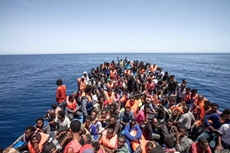EU pins hopes on Turkey to resolve migrant crisis
08 Mar 2016
European Union leaders sat down with Turkey's prime minister today seeing a glimmer of hope for an end to the refugee crisis that has divided Europe, but they were troubled by having to seek favours from a government that scorns their ideas of human rights.
 With tens of thousands of migrants hoping to reach Germany stranded in Greece by the closing of borders, the summit will formalise the closure of the Balkan route out of Greece, diplomats said, while pledging help to Athens and seeking assurances that Turkey will, with NATO naval back-up, bar the sea to people smugglers.
With tens of thousands of migrants hoping to reach Germany stranded in Greece by the closing of borders, the summit will formalise the closure of the Balkan route out of Greece, diplomats said, while pledging help to Athens and seeking assurances that Turkey will, with NATO naval back-up, bar the sea to people smugglers.
The leaders in Brussels are likely to tell Turkish Prime Minister Ahmet Davutoglu of concerns about rights after the Turkish government seized control of a newspaper critical of its policies. But EU officials said they will also be anxious not to alienate Ankara just as hopes are rising of a solution to the crisis.
Fellow EU leaders, long bitterly divided over how to end chaotic movements that have put Europe's Schengen free-movement system in jeopardy, will also assure Greek Prime Minister Alexis Tsipras of help housing those now stranded in Greece who hope to follow the million that found refuge in Germany last year.
An EU endorsement of recent border closures by Macedonia, Austria and other countries on the route north from Greece will be accompanied by a renewed commitment to revive plans to relocate asylum claimants around the EU, diplomats said.
A draft EU agreement will declare that the "West Balkan route is closed", although diplomats added that the statement was likely to go through considerable redrafting.
NATO said on Sunday a new naval force secured approval for operating in Turkish and Greek waters. That will lend force to a deal with Turkey to take back migrants halted in its waters and those who reach Greek islands but fail to qualify for asylum.
Meeting Davutoglu two days after his government seized control of Zaman, Turkey's top-selling newspaper, EU leaders are torn between anger at Ankara's action and fear of derailing Turkish willingness to stop migrants sailing for Greece.
European Council President Donald Tusk, the former Polish premier who is chairing today's talks, had barely left a meeting with President Tayyip Erdogan on Friday and declared cautious optimism on the migrant crisis when police seized the newspaper. "It's a slap in the face," one senior EU official told Reuters after EU envoys met in Brussels on Sunday evening.
Amnesty International's deputy director for Europe, Gauri van Gulik, said, "Using Turkey as a 'safe third country' is absurd ... Europe has an absolute duty to protect refugees and must make the bold decision to fast-track significant, unconditional resettlement as a matter of urgency."
However, German Chancellor Angela Merkel, who faces regional elections next Sunday, which will pass judgment on her much-criticised decision to open the door to Syrian refugees last summer, is keen to see a three-month old deal with Ankara start working fast. She met Davutoglu in Brussels late on Sunday.
Germany has been pushing for resettlement of thousands of Syrian refugees from the more than two million in Turkey. But diplomats say that is unlikely to be discussed in detail by other EU leaders until they see flows from Turkey are falling.
Turkish raids
Over a weekend that saw at least another 18 people drown in the straits, Turkish police mounted a raid on a beach opposite Lesbos. Reuters journalists saw them stop some 120 migrants from leaving and arrest at least two from a migrant-smuggling gang.
However, some 30,000 migrants are bottled up in Greece and 2,000 to 3,000 more arrive daily. Tsipras, struggling with an economy blighted by the euro crisis, has called for urgent help and insisted Greece will not become a "warehouse of souls".
EU officials believe that signs Europe's external border in Greece is being brought under control can ease resistance from some in the Union to a plan to relocate asylum seekers from Greece to other European countries - a scheme that has seen barely 300 people move from Greece over the past few months.
Three months ago, EU leaders, fearful that border closures have put their Schengen passport-free zone in jeopardy, agreed to provide 3 billion euros ($3.3 billion) to help care for Syrian refugees in Turkey. They also promised to revive talks on Ankara's EU membership and speed up a plan to give Turkish travellers easier visa access to the European Union.



















